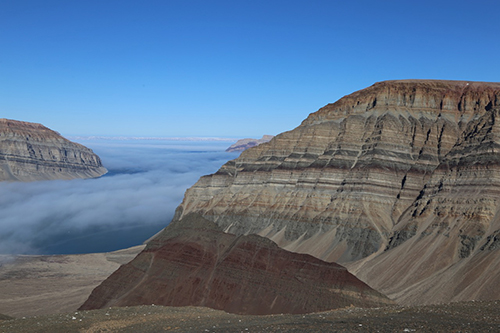The ca. 1 Ga record of early eukaryotic evolution and ocean oxygenation in northeastern Canada
 The late Mesoproterozoic–early Neoproterozoic Bylot Supergroup and equivalent strata occur in a series of sedimentary basins exposed on the Arctic islands of northeastern Canada and on northwestern Greenland. The tectonic origin of these basins is controversial and their age poorly calibrated. However, these well preserved and excellently exposed rocks are central to our understanding of the evolving Proterozoic biosphere because they preserve the oldest known fossils of crown group eukaryotes (fossil red algae), and sedimentary evidence for increasing oxidation of the oceans and atmosphere. PROPS PhD and MSc students are working on a series of interrelated projects on the Borden Basin on northern Baffin Island aimed at producing new radioisotopic ages on these basins, unravelling their tectonic history, and documenting paleoenvironmental conditions during this critical time in Earth's history. With support from the Agouron Institute and in collaboration with colleagues at the Geological Survey of Canada, Laurentian University and others in Europe and Australia, we have recently undertaken a new project aimed at improving the fossil and biogeochemical record of early Eukaryotic evolution. The next field season is scheduled for July, 2016.
The late Mesoproterozoic–early Neoproterozoic Bylot Supergroup and equivalent strata occur in a series of sedimentary basins exposed on the Arctic islands of northeastern Canada and on northwestern Greenland. The tectonic origin of these basins is controversial and their age poorly calibrated. However, these well preserved and excellently exposed rocks are central to our understanding of the evolving Proterozoic biosphere because they preserve the oldest known fossils of crown group eukaryotes (fossil red algae), and sedimentary evidence for increasing oxidation of the oceans and atmosphere. PROPS PhD and MSc students are working on a series of interrelated projects on the Borden Basin on northern Baffin Island aimed at producing new radioisotopic ages on these basins, unravelling their tectonic history, and documenting paleoenvironmental conditions during this critical time in Earth's history. With support from the Agouron Institute and in collaboration with colleagues at the Geological Survey of Canada, Laurentian University and others in Europe and Australia, we have recently undertaken a new project aimed at improving the fossil and biogeochemical record of early Eukaryotic evolution. The next field season is scheduled for July, 2016.
This project is supported by Agouron Institute, NSERC, NRCan Gem 2, Polar Continental Shelf Program and Northern Science Training Program.